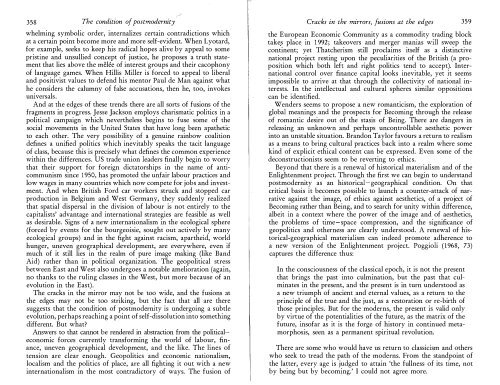The Condition of Postmodernity 13 - autonomous learning
The Condition of Postmodernity 13 - autonomous learning
The Condition of Postmodernity 13 - autonomous learning
Create successful ePaper yourself
Turn your PDF publications into a flip-book with our unique Google optimized e-Paper software.
358 <strong>The</strong> condition <strong>of</strong> postmodernitywhelming symbolic order, internalizes certain contradictions whichat a certain point become more and more self-evident. When Lyotard,for example, seeks to keep his radical hopes alive by appeal to somepristine and unsullied concept <strong>of</strong> justice, he proposes a truth statementthat lies above the melee <strong>of</strong> interest groups and their cacophony<strong>of</strong> language games. When Hillis Miller is forced to appeal to liberaland positivist values to defend his mentor Paul de Man against whathe considers the calumny <strong>of</strong> false ' accusations, then he, too, invokesuniversals.And at the edges <strong>of</strong> these trends there are all sorts <strong>of</strong> fusions <strong>of</strong> thefragments in progress. Jesse Jackson employs charismatic politics in apolitical campaign which nevertheless begins to fuse some <strong>of</strong> thesocial movements in the United States that have long been apatheticto each other. <strong>The</strong> very possibility <strong>of</strong> a genuine rainbow coalitiondefines a unified politics which inevitably speaks the tacit language<strong>of</strong> class, because this is precisely what defines the common experiencewithin the differences. US trade union leaders finally begin to worrythat their support for foreign dictatorships in the name <strong>of</strong> anticommunismsince 1950, has promoted the unfair labour practices andlow wages in many countries which now compete for jobs and investment.And when British Ford ,car workers struck and stopped carproduction in Belgium and West Germany, they suddenly realizedthat spatial dispersal in the division <strong>of</strong> labour is not entirely to thecapitalists' advantage and international strategies are feasible as wellas desirable. Signs <strong>of</strong> a new internationalism in the ecological sphere(forced by events for the bourgeoisie, sought out actively by manyecological groups) and in the fight against racism, apartheid, worldhunger, uneven geographical development, are everywhere, even ifmuch <strong>of</strong> it still lies in the realm <strong>of</strong> pure image making (like BandAid) rather than in political organization. <strong>The</strong> geopolitical stressbetween East and West also undergoes a notable amelioration (again,no thanks to the ruling classes in the West, but more because <strong>of</strong> anevolution in the East).<strong>The</strong> cracks in the mirror may not be too wide, and the fusions atthe edges may not be too striking, but the fact that all are theresuggests that the condition <strong>of</strong> postmodernity is undergoing a subtleevolution, perhaps reaching a point <strong>of</strong> self-dissolution into somethingdifferent. But what?Answers to that cannot be rendered in abstraction from the politicaleconomicforces currently transforming the world <strong>of</strong> labour, finance,uneven geographical development, and the like. <strong>The</strong> lines <strong>of</strong>tension are clear enough. Geopolitics and economic nationalism,localism and the politics <strong>of</strong> place, are all fighting it out with a newinternationalism in the most contradictory <strong>of</strong> ways. <strong>The</strong> fusion <strong>of</strong>Cracks in the mirrors, fusions at the edgesthe European Economic Community as a commodity trading blocktakes place in 1992; takeovers and merger manias will sweep thecontinent; yet Thatcherism still proclaims itself as a distinctivenational project resting upon the peculiarities <strong>of</strong> the British (a propositionwhich both left and right politics tend to accept). Internationalcontrol over finance capital looks inevitable, yet it seemsimpossible to arrive at that through the collectivity <strong>of</strong> national interests.In the intellectual and cultural spheres similar oppositionscan be identified.Wenders seems to propose a new romanticism, the exploration <strong>of</strong>global meanings and the prospects for Becoming through the release<strong>of</strong> romantic desire out <strong>of</strong> the stasis <strong>of</strong> Being. <strong>The</strong>re are dangers inreleasing an unknown and perhaps uncontrollable aesthetic powerinto an unstable situation. Brandon Taylor favours a return to realismas a means to bring cultural practices back into a realm where somekind <strong>of</strong> explicit ethical content can be expressed. Even some <strong>of</strong> thedeconstructionists seem to be reverting to ethics.Beyond that there is a renewal <strong>of</strong> historical materialism and <strong>of</strong> theEnlightenment project. Through the first we can begin to understandpostmodernity as an historical-geographical condition. On thatcritical basis it becomes possible to launch a counter-attack <strong>of</strong> narrativeagainst the image, <strong>of</strong> ethics against aesthetics, <strong>of</strong> a project <strong>of</strong>Becoming rather than Being, and to search for unity within difference,albeit in a context where the power <strong>of</strong> the image and <strong>of</strong> aesthetics,the problems <strong>of</strong> time-space compression, and the significance <strong>of</strong>geopolitics and otherness are clearly understood. A renewal <strong>of</strong> historical-geographicalmaterialism can indeed promote adherence toa new version <strong>of</strong> the Enlightenment project. Poggioli (1968, 73)captures the difference thus:In the consciousness <strong>of</strong> the classical epoch, it is not the presentthat brings the past into culmination, but the past that culminatesin the present, and the present is in turn understood asa new triumph <strong>of</strong> ancient and eternal values, as a return to theprinciple <strong>of</strong> the true and the just, as a restoration or re-birth <strong>of</strong>those principles. But for the moderns, the present is valid onlyby virtue <strong>of</strong> the potentialities <strong>of</strong> the future, as the matrix <strong>of</strong> thefuture, ins<strong>of</strong>ar as it is the forge <strong>of</strong> history in continued metamorphosis,seen as a permanent spiritual revolution.<strong>The</strong>re are some who would have us return to classicism and otherswho seek to tread the path <strong>of</strong> the moderns. From the standpoint <strong>of</strong>the latter, every age is judged to attain 'the fullness <strong>of</strong> its time, notby being but by becoming.' I could not agree more.359
















